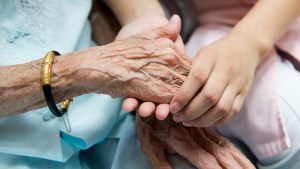The first attitude that we should have when we contemplate our dignity is respect, and rejection of anything that turns human beings into a means to an end, not an end in and of themselves. We cannot treat any human being as an object, a “thing,” a means to achieve our personal goals. This moral imperative can take the form of various principles that should guide our behavior in concrete ways.
The principle of respect
In every action and intention, in every goal and every means, always treat each and every person — yourself and others — with the respect they deserve due to their dignity and value as a person. Every human being has equal intrinsic dignity and value, due to their basic condition of being human. The value of human beings is different from that of other things around us, which we use. Things have value based on exchange. They are replaceable. Human beings, on the contrary, have unlimited value, because as individuals with a unique identity, capable of knowing and choosing, they are unique and irreplaceable.
The principle of respect requires all people in general to be treated with respect. Objects can be manipulated and used, but not people: the freedom of choice of every human being must be respected. The principle of respect doesn’t only apply to other people, but also to ourselves. Thus, for example, self-respect means acting with integrity, whatever our profession may be.
The principle of good will and not ill will
In each and every one of your actions, avoid harming other people, and always seek their well-being.
Principle of double effect
In your actions, seek above all a beneficial effect. Assuming that in both your actions and your intentions you treat everyone with respect, ensure that there are no foreseeable harmful secondary effects out of proportion to the good that follows from the primary effect of your actions.
The principle of integrity
Behave at all times with the honesty of an authentic professional, making all your decisions with the respect you owe yourself, such that you make yourself worthy of living your profession to its fullness. Being a professional doesn’t mean just exercising a profession; it also means exercising it with professionalism — that is to say, with profound knowledge of your field, with total loyalty to ethical norms, and seeking to serve other people and society above any selfish interests.
The principle of justice
Treat others as is their due as human beings; be just, treating all people the same way. That is to say, treat each person in a similar way in similar circumstances. The main idea of the principle of justice is to treat people as we should, as corresponds to their equal dignity. This can manifest itself in different ways, since there are different kinds or aspects of justice. These include substantive justice, distributive justice, commutative justice, procedural justice, and retributive justice.
The principle of utility
Assuming that in both your actions and your intentions you treat all people with respect, always choose that form of action that will produce the greatest benefit for the greatest number of people. The principle of utility places emphasis on the consequences of an action. Nonetheless, it presupposes that you have acted with respect towards all involved. If you have to choose between two morally permissible actions, chose the one that has a better result for more people.
There’s an easy criterion you can use to determine if you are treating someone with respect: ask yourself whether or not the action you are going to perform could go both ways. That is to say, would you want someone to do to you what you are planning to do to someone else? This is the fundamental idea contained in the Golden Rule: “Treat others as you would have them treat you.” This idea isn’t unique to Christians; it is common in many religions and cultures.

Read more:
What’s at the root of every other value we hold dear?

Read more:
How to teach human dignity and modesty to kids from an early age

